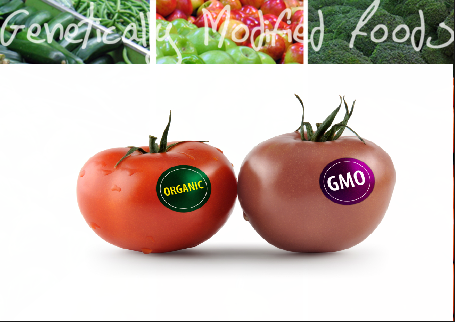Genetically modified foods (GM foods), also known as genetically engineered foods (GE foods), or bioengineered nourishments are nourishments delivered from life forms that have had changes brought into their DNA utilizing the techniques for hereditary designing. Hereditary designing strategies take into consideration the presentation of new qualities just as more noteworthy authority over characteristics when contrasted with past techniques, for example, particular rearing and change reproducing.
Commercial sale of genetically modified foods began in 1994, when Calgene first marketed its unsuccessful Flavr Savr delayed-ripening tomato. Most food modifications have primarily focused on cash crops in high demand by farmers such as soybean, corn, canola, and cotton. Genetically modified crops have been engineered for resistance to pathogens and herbicides and for better nutrient profiles. GM livestock have been developed, although, as of November 2013, none were on the market.
Genetically modified food definition
There is a scientific consensus that currently available food derived from GM crops poses no greater risk to human health than conventional food,but that each GM food needs to be tested on a case-by-case basis before introduction. Nonetheless, members of the public are much less likely than scientists to perceive GM foods as safe. The legal and regulatory status of GM foods varies by country, with some nations banning or restricting them, and others permitting them with widely differing degrees of regulation.Genetically modified food examples
However, there are ongoing public concerns related to food safety, regulation, labelling, environmental impact, research methods, and the fact that some GM seeds, along with all new plant varieties, are subject to plant breeders' rights owned by corporations.Crops
- Fruits and vegetables
- Corn
- Soy
- Rice
- Wheat
Genetically modified food products
- Corn starch and starch sugars, including syrups
- Lecithin
- Sugar
- Vegetable oil
Genetically modified food uses
- Animal feed
- Proteins
- Livestock
- Salmon
Genetically modified foods benefits and risks
There is a scientific consensus that currently available food derived from GM crops poses no greater risk to human health than conventional food, but that each GM food needs to be tested on a case-by-case basis before introduction. Nonetheless, members of the public are much less likely than scientists to perceive GM foods as safe. The legal and regulatory status of GM foods varies by country, with some nations banning or restricting them, and others permitting them with widely differing degrees of regulation.Opponents claim that long-term health risks have not been adequately assessed and propose various combinations of additional testing, labeling or removal from the market. The advocacy group European Network of Scientists for Social and Environmental Responsibility (ENSSER), disputes the claim that "science" supports the safety of current GM foods, proposing that each GM food must be judged on case-by-case basis.
Testing
The legal and regulatory status of GM foods varies by country, with some nations banning or restricting them, and others permitting them with widely differing degrees of regulation. Countries such as the United States, Canada, Lebanon and Egypt use substantial equivalence to determine if further testing is required, while many countries such as those in the European Union, Brazil and China only authorize GMO cultivation on a case-by-case basis. In the U.S. the FDA determined that GMO's are "Generally Recognized as Safe" (GRAS) and therefore do not require additional testing if the GMO product is substantially equivalent to the non-modified product. If new substances are found, further testing may be required to satisfy concerns over potential toxicity, allergenicity, possible gene transfer to humans or genetic outcrossing to other organisms.Controversies
The genetically modified foods controversy consists of a set of disputes over the use of food made from genetically modified crops. The disputes involve consumers, farmers, biotechnology companies, governmental regulators, non-governmental organizations, environmental and political activists and scientists. The major disagreements include whether GM foods can be safely consumed, harm the environment and/or are adequately tested and regulated. The objectivity of scientific research and publications has been challenged. Farming-related disputes include the use and impact of pesticides, seed production and use, side effects on non-GMO crops/farms, and potential control of the GM food supply by seed companies.The conflicts have continued since GM foods were invented. They have occupied the media, the courts, local, regional, national governments, and international organizations.


